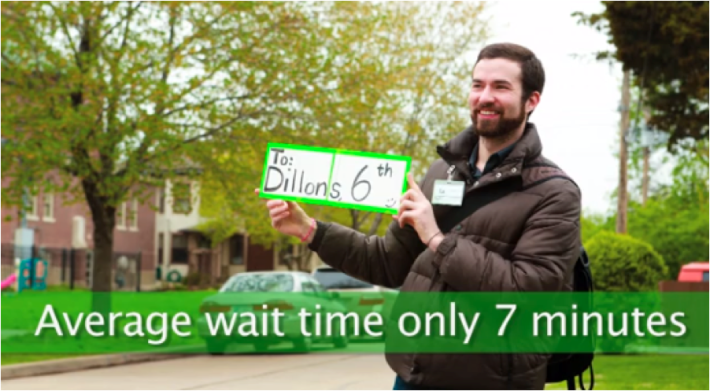
Amid the buzz about the “sharing economy,” you'd be forgiven for missing one key element: Most "ride-sharing" is really just a slicker, app-based version of the old-fashioned taxi cab.
Ride-sharing at its best takes cars off the road by connecting people who need to make similar trips (rather than dispatching drivers to pick them up). The word "hitch-hiking" is out of fashion, but now it's being re-branded as "roadside ride-sharing" -- and it could help people in small, rural towns get around without depending so much on their own car.
That's the mission of Jenny O'Brien, who launched Lawrence OnBoard last year in her Kansas town. She sent 23 volunteers out with dry-erase boards announcing their destinations. Ninety-five percent of them got a ride in less than half an hour, and the average wait time was less than seven minutes. That told her she was onto something, and she set about operationalizing the concept.
She met the head of Carma, a new ride-sharing start-up that was looking to solve its "critical mass problem." In a post for MobilityLab, O'Brien explains how her concept meshed with Carma's needs:
Its carpooling app is wildly successful in cities like San Francisco and Austin, but it takes a lot of effort to build that momentum. A roadside approach sidesteps the need for an initial critical mass, and works especially well in the very places where traditional ridesharing programs don’t.
They call their hybrid service CarmaHop: a hitch-hiking app where passengers still use good old-fashioned dry erase boards to flag drivers but also get an added layer of safety, since they can create a profile and document the trip. The app also processes the payment.
Of course, another part of the solution to the critical mass issue is that random drivers who aren’t connected to CarmaHop can stop for a passenger -- but then the app’s safety enhancement is nullified.
“That is a little bit of a downside,” O’Brien told Streetsblog. “If somebody pulls up and they’re not part of the system -- they’re just a random stranger -- you can still get in the car with them; you just have to use your good judgment. But it’s a way to pull people into the system very quickly and easily, and you’ll still get a ride even if you don’t get a match.”
If the driver isn’t registered with CarmaHop, you can’t log the license plate and car information in the app but it does record where you got picked up and where you got dropped off.
O'Brien says it's not really hitch-hiking any more, so they're calling it “roadside ridesharing" -- which sounds like a synonym to me, but I'll go with the group on this one. Either way, it's truer to the "sharing" concept than taxi-type services like Uber and Lyft, and the early signs indicate it can work in places that don't have the critical mass for a fully app-based matching service.
CarmaHop is putting the finishing touches on the concept this summer and is on schedule to launch in the fall.





